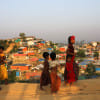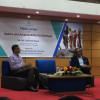34% of Rohingya fund raised so far: Report
Only 34 percent of the $434 million needed to provide assistance to 1.2 million people, including host communities in Cox's Bazar district, has been raised when Rohingyas are still suffering from various problems, says a new report released today.
"Humanitarian partners are working round the clock to respond, but the reality remains that the needs are massive and urgent, and the gaps are wide. More funding is needed," said Mia Seppo, UN Resident Coordinator in Bangladesh.
Bangladesh is one of the most densely populated countries in the world, but more land is needed to improve conditions in the congested camps, said the UN official.
One hundred days after the start of the most recent influx, the Inter-Sector Coordination Group (ISCG) released the report on the overall status of the humanitarian response to the Rohingya crisis in Bangladesh.
READ MORE: UN braces for further exodus
There are more than 830,000 Rohingya refugees in Cox's Bazar: 625,000 of them have poured over the border since August 25.
These Rohingyas are now living in ten different camps, and among Bangladeshi host communities.
One of the camps has become the largest and fastest growing refugee camp in the world, where approximately half a million people are living extremely close to each other without access to basic services such as toilets or clinics.
READ MORE: Is Rohingya repatriation a pipe dream?
The Monitoring Report, which covers the first two months of the response from August 25 to October 31, highlights the work of the government of Bangladesh, in cooperation with humanitarian partners who are working to provide relief services for the refugee population and Bangladeshi host communities.
Of the 1.2 million people in need, around half have been reached with assistance.
The report also explains the challenges and gaps that remain.
The risk of disease outbreak is high, and the impact of a cyclone or heavy rain would be massive.
There is not enough land to provide adequate living conditions for the more than 830,000 Rohingyas that now crowd Cox's Bazar.
The report defines life-saving priorities for the coming months.
These include improving nutrition, preventing and managing disease outbreak, adequate planning for the new camps, and improving protection across all areas of the response.

 For all latest news, follow The Daily Star's Google News channel.
For all latest news, follow The Daily Star's Google News channel. 








Comments